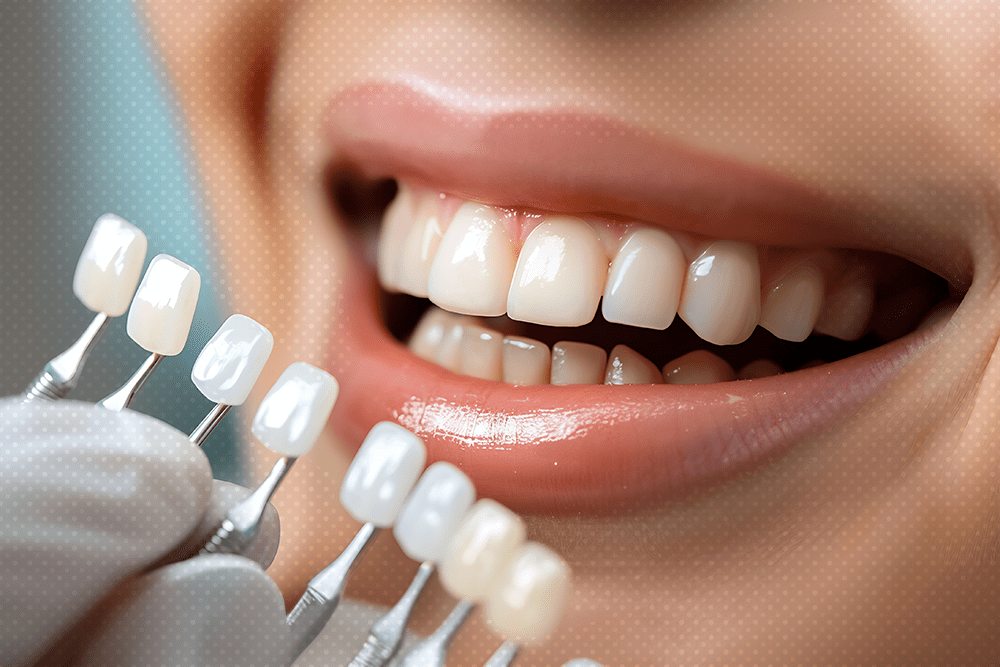Cosmetic dentistry focuses on improving the appearance of a person’s teeth, mouth, and smile. While traditional dentistry addresses oral health and hygiene, cosmetic procedures are elective and aim to enhance personal aesthetics. These treatments can address issues like discoloration, misalignment, chips, and gaps. A common and effective option within cosmetic dentistry is the application of veneers. Here’s information on veneers and their benefits:
What Are Veneers?
Veneers are thin, custom-made shells designed to cover the front surface of teeth to improve their appearance. They are crafted from materials that mimic the look of natural tooth enamel and are bonded directly to the teeth. This process can alter teeth, providing a solution for a range of cosmetic concerns. Veneers can change teeth’s:
- Color
- Shape
- Size
- Length
During an initial consultation, the dentist will examine your teeth to determine if veneers are a suitable option and discuss your desired outcome. To prepare a tooth for a traditional veneer, the dentist usually removes a small amount of enamel from the tooth surface. This creates room for the veneer to be placed.
An impression of your teeth is then taken to create a precise model, which is sent to a dental laboratory where the custom veneer set is made. Once ready, your set is bonded to your teeth using a special cement and cured with a light for a strong, lasting fit. With proper care, veneers can last for 10 to 15 years.
Are There Different Types?
Several types of veneers are available, each with distinct materials, application processes, and benefits. The range of options means that patients in all kinds of circumstances and with various mouth types can wear veneers. Consulting with a dental professional helps you determine which option is most appropriate for your situation.
Composite & Porcelain Options
Porcelain and composite resin are the two most common materials used for veneer sets. Composite resin veneers are made from a tooth-colored resin material that is bonded directly onto the tooth. The dentist applies the composite material in layers, carefully sculpting and shaping it to achieve the desired look.
Porcelain veneers are known for their durability and natural-looking appearance. They have a translucent quality similar to natural tooth enamel and are highly resistant to staining. The process for porcelain sets usually requires at least two dental visits.
No-prep & Removable Options
For individuals seeking less invasive options, no-prep and removable veneers are available. No-prep options require minimal to no removal of the tooth’s enamel before placement. They are much thinner than traditional veneers, and the application process is reversible because less enamel is removed. This makes them an attractive option for those hesitant to alter their natural tooth structure permanently.
Removable options, sometimes called snap-on veneers, are a non-permanent appliance that fits over your natural teeth. They can be taken out for cleaning and sleeping. While they offer a temporary cosmetic solution and do not require any alteration of the teeth, they do not function like permanent veneers and are typically not intended for everyday, long-term wear.
How Can You Prepare?
Maintaining good oral hygiene is invaluable before, during, and after the veneer process. This includes regular brushing, flossing, and dental check-ups. Preparation for veneers begins with a thorough dental consultation.
Your dentist will evaluate your oral health to make sure your teeth and gums are healthy enough for the procedure, as any underlying issues like cavities or gum disease must be addressed first. Discuss your cosmetic goals with your dentist and prepare some questions to ask. Understanding the cost, timeline, and maintenance requirements will help you make a well-informed decision.
Schedule an Appointment
If you want veneers to enhance your smile, the first step is to consult with a qualified dental professional. A comprehensive examination and a detailed discussion about your aesthetic goals will help determine if veneers are the right choice for you. A dentist can provide personalized information about the different types of veneers, explain the procedure in detail, and help you create a treatment plan tailored to your unique needs. Schedule a dental appointment today.


Leave a Reply